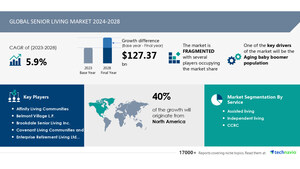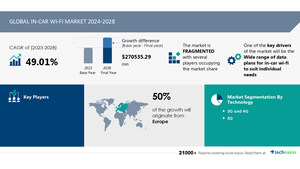NEW YORK, Nov. 7, 2024 /PRNewswire/ -- Report on how AI is redefining market landscape - The global sleep apnea implants market size is estimated to grow by USD 401.75 million from 2024-2028, according to Technavio. The market is estimated to grow at a CAGR of 15.2% during the forecast period. Increasing prevalence of sleep apnea and respiratory disorders is driving market growth, with a trend towards rising awareness about sleep apnea. However, regulatory challenges in global sleep apnea implants market poses a challenge.Key market players include Advanced Brain Monitoring Inc., Asahi Kasei Corp., Avery Biomedical Devices Inc., Cleveland Medical Devices Inc., Contec Medical Systems Co. Ltd., DeVilbiss Healthcare GmbH, Fisher and Paykel Healthcare Corp. Ltd., Inspire Medical Systems Inc., Koninklijke Philips N.V., Linguaflex Inc., LivaNova PLC, Medtronic Plc, Nihon Kohden Corp., Nox Medical, Nyxoah SA, ResMed Inc., Siesta Medical Inc., SomnoMed Ltd., Somnowell Ltd., and Vyaire Medical Inc..
AI-Powered Market Evolution Insights. Our comprehensive market report ready with the latest trends, growth opportunities, and strategic analysis- View Free Sample Report PDF
Forecast period |
2024-2028 |
Base Year |
2023 |
Historic Data |
2018 - 2022 |
Segment Covered |
Indication (Central sleep apnea and Obstructive sleep apnea), End-user (Ambulatory surgical centers, Hospitals, and Others), and Geography (North America, Europe, Asia, and Rest of World (ROW)) |
Region Covered |
North America, Europe, Asia, and Rest of World (ROW) |
Key companies profiled |
Advanced Brain Monitoring Inc., Asahi Kasei Corp., Avery Biomedical Devices Inc., Cleveland Medical Devices Inc., Contec Medical Systems Co. Ltd., DeVilbiss Healthcare GmbH, Fisher and Paykel Healthcare Corp. Ltd., Inspire Medical Systems Inc., Koninklijke Philips N.V., Linguaflex Inc., LivaNova PLC, Medtronic Plc, Nihon Kohden Corp., Nox Medical, Nyxoah SA, ResMed Inc., Siesta Medical Inc., SomnoMed Ltd., Somnowell Ltd., and Vyaire Medical Inc. |
Key Market Trends Fueling Growth
Sleep apnea implants are gaining significance in the healthcare industry due to the increasing awareness about the importance of good quality sleep for overall health and productivity. Obstructive Sleep Apnea (OSA) is a common disorder that causes interruptions in breathing during sleep, leading to reduced oxygen levels and increased blood pressure. If left untreated, severe sleep apnea can increase the risk of heart problems. To address this issue, various organizations, key vendors, and government bodies are conducting campaigns to promote awareness about sleep apnea and sleep apnea implants. Key players in the market, including Koninklijke Philips, ResMed, Fisher & Paykel Healthcare, are engaging in promotional activities to increase awareness among both patients and healthcare professionals. For instance, Philips launched a stand-up comedy clip in March 2021 to educate people about the importance of sleep and sleep disorders like sleep apnea. Similarly, ResMed partnered with Verily to develop software solutions for sleep apnea and other respiratory disorders. Non-profit organizations, such as the American Sleep Association, National Sleep Foundation, the CDC, and the National Institutes of Health (NIH), are also conducting awareness and educational campaigns on sleep apnea. These campaigns aim to expand and promote awareness of sleep health and the prevention of sleep apnea. In the UK, organizations like the Scottish Association for Sleep Apnoea and the Sleep Apnoea Trust Association work to increase awareness about sleep apnea. The collaborative efforts of these organizations are expected to increase awareness about sleep apnea-related disorders, leading to an increase in the adoption of sleep apnea implants. This, in turn, will drive the growth of the sleep apnea implants market during the forecast period.
The Sleep Apnea Implants market is witnessing significant growth due to the increasing clinical trials for new devices like palatal implants, bone screw systems, and phrenic nerve stimulators. These implants offer effective solutions for obstructive sleep apnea (OSA) therapy, addressing symptoms such as snoring, sleep breathing interruptions, and daytime sleepiness. Cardiovascular conditions like atherosclerosis, hypertension, stroke, diabetes, and depression are linked to OSA, creating a high demand for these implants. Technological advancements, such as midface advancement and hypoglossal neurostimulators, improve treatment outcomes. Symptoms like airway irritation and disturbed sleep can lead to severe health-related complications, including fatal accidents and sleep deprivation disorders. The adult American population suffering from chronic sleep apnea and other sleep-related disorders, such as insomnia, jet lag, narcolepsy, and sleepwalking, is substantial. Obesity and a high body mass index are significant factors contributing to OSA. Therefore, the development of these implants is crucial for addressing the underlying causes of sleep apnea, including throat muscle activity and upper respiratory tract obstruction. Clinical studies and ongoing research continue to drive innovation in this field. Inspire Therapy, a leading player in the market, is revolutionizing OSA treatment with its innovative approach to addressing the root cause of the condition. The future of sleep apnea implants lies in continued technological advancements and clinical studies to improve patient outcomes and quality of life.
Insights on how AI is driving innovation, efficiency, and market growth- Request Sample!
Market Challenges
- The global sleep apnea implants market is subject to stringent regulations, with manufacturers required to adhere to guidelines and standards set by regulatory bodies like the US FDA and EMA. These regulations cover various aspects, including product design, manufacturing, labeling, and marketing. Obtaining regulatory approval for new sleep apnea implants is a significant challenge, with a time-consuming and costly process involving extensive data on safety and efficacy. Frequently changing regulations add to the complexity, and international regulations and standards further complicate market entry for new players. Manufacturers must stay updated on these regulations to avoid non-compliance issues and remain competitive in the industry. These regulatory challenges pose a barrier to market growth for the global sleep apnea implants market.
- The sleep deprivation disorders market, including sleep apnea, presents significant challenges for the healthcare ecosystem. Chronic sleep apnea disorders like obstructive sleep apnea can lead to fatal accidents, health-related complications, and disturbed sleep. The adult American population suffering from sleep disorders, such as insomnia, jet lag, narcolepsy, sleepwalking, and sleep apnea, is on the rise. Sleep Apnea Implants, like Hypoglossal neurostimulation devices from Signifier Medical Technologies, offer effective solutions. However, high costs and stringent government regulations pose challenges for the medical device industry. Sleep awareness programs, sleep hygiene, technological aid through sleep trackers, movement monitoring wearables, and sleep centers play a crucial role in diagnosis. Sleep disorder treatments, including surgery and medical practices, aim to improve natural breathing mechanisms and oxygen flow. Peri-operative complications and inspiring medical systems are areas of ongoing research. Sleep Apnea Week highlights the importance of addressing these challenges and promoting awareness. Additionally, conditions like peripheral artery disease and limb ischemia can further complicate sleep apnea management.
Insights into how AI is reshaping industries and driving growth- Download a Sample Report
Segment Overview
This sleep apnea implants market report extensively covers market segmentation by
- Indication
- 1.1 Central sleep apnea
- 1.2 Obstructive sleep apnea
- End-user
- 2.1 Ambulatory surgical centers
- 2.2 Hospitals
- 2.3 Others
- Geography
- 3.1 North America
- 3.2 Europe
- 3.3 Asia
- 3.4 Rest of World (ROW)
1.1 Central sleep apnea- Central sleep apnea, a condition characterized by the brain's inability to send proper signals to breathing muscles during sleep, can lead to serious health complications, including heart disease, diabetes, glaucoma, cancer, cognitive and behavioral disorders. Rising awareness and diagnosis of this condition are driving the demand for effective treatment options. Sleep apnea implants, which are the most common treatment for central sleep apnea, are experiencing market growth due to the increasing prevalence of the condition, new product launches, and better insurance coverage. Advanced implant technology, such as devices designed specifically for central sleep apnea, are expanding treatment options for those who cannot tolerate or find traditional therapies, like continuous positive airway pressure machines, adequate. Market vendors are employing strategies like product portfolio expansion and collaborations to expand their geographic reach, further fueling market growth during the forecast period.
Download complimentary Sample Report to gain insights into AI's impact on market dynamics, emerging trends, and future opportunities- including forecast (2024-2028) and historic data (2018 - 2022)
Research Analysis
Sleep deprivation disorders, including sleep apnea, can lead to fatal accidents and health-related complications due to disturbed sleep and sleepiness. Sleep apnea disorder, a common sleep-related disorder, disrupts the natural breathing mechanism during sleep, leading to oxygen flow interruptions. Symptoms include snoring, sleepiness, insomnia, and sleep-related breathing disorders. High costs and stringent government regulations make Sleep Apnea Implants an attractive solution for some patients. These devices, such as those offered by Inspire Medical System, help restore normal breathing by stimulating the airway muscles to keep the airway open during sleep. However, peri-operative complications and airway irritation are potential risks. Jet lag and other factors can also exacerbate sleep apnea symptoms. The healthcare ecosystem continues to explore innovative solutions to address the growing prevalence of sleep apnea and improve patient outcomes.
Market Research Overview
Sleep deprivation disorders, including sleep apnea, can lead to fatal accidents, health-related complications, and disturbed sleep. Sleep Apnea Implants, such as Hypoglossal neurostimulation devices, are gaining popularity as effective sleep apnea treatments. These devices stimulate the hypoglossal nerve to maintain the airway during sleep, improving sleep quality and reducing sleepiness. Sleep disorders, including insomnia, jet lag, narcolepsy, sleepwalking, and sleep apnea, affect a significant portion of the adult American population. Chronic sleep apnea disorders can lead to cardiovascular conditions like atherosclerosis, hypertension, stroke, diabetes, and depression. The medical device industry is investing in sleep apnea devices, including sleep trackers, wearables, and movement monitoring technology. Sleep awareness programs, sleep hygiene, and technological aid are also crucial in managing sleep disorders. During Sleep Awareness Week, various healthcare ecosystem players, including hospitals, care centers, and sleep centers, focus on raising awareness and providing diagnosis and treatment options. Sleep apnea disorder, such as Obstructive Sleep Apnea (OSA), disrupts natural breathing mechanisms by obstructing oxygen flow. High costs and stringent government regulations pose challenges to the market's growth. Peri-operative complications and the need for surgery are also concerns. However, technological advancements, such as Midface advancement, OSA therapy, and Hypoglossal neurostimulator, offer promising solutions. Symptoms of sleep apnea include snoring, airway irritation, and sleep breathing interruptions. The severity of these symptoms can vary, and clinical studies are ongoing to develop new treatments, including Palatal implants, bone screw systems, and Phrenic nerve stimulators. Additionally, factors like body mass index, obesity, and upper respiratory tract issues can contribute to sleep apnea. Muscle activity and clinical trials are also areas of focus in the development of sleep apnea implants.
Table of Contents:
1 Executive Summary
2 Market Landscape
3 Market Sizing
4 Historic Market Size
5 Five Forces Analysis
6 Market Segmentation
- Indication
- Central Sleep Apnea
- Obstructive Sleep Apnea
- End-user
- Ambulatory Surgical Centers
- Hospitals
- Others
- Geography
- North America
- Europe
- Asia
- Rest Of World (ROW)
7 Customer Landscape
8 Geographic Landscape
9 Drivers, Challenges, and Trends
10 Company Landscape
11 Company Analysis
12 Appendix
About Technavio
Technavio is a leading global technology research and advisory company. Their research and analysis focuses on emerging market trends and provides actionable insights to help businesses identify market opportunities and develop effective strategies to optimize their market positions.
With over 500 specialized analysts, Technavio's report library consists of more than 17,000 reports and counting, covering 800 technologies, spanning across 50 countries. Their client base consists of enterprises of all sizes, including more than 100 Fortune 500 companies. This growing client base relies on Technavio's comprehensive coverage, extensive research, and actionable market insights to identify opportunities in existing and potential markets and assess their competitive positions within changing market scenarios.
Contacts
Technavio Research
Jesse Maida
Media & Marketing Executive
US: +1 844 364 1100
UK: +44 203 893 3200
Email: [email protected]
Website: www.technavio.com/
SOURCE Technavio

WANT YOUR COMPANY'S NEWS FEATURED ON PRNEWSWIRE.COM?
Newsrooms &
Influencers
Digital Media
Outlets
Journalists
Opted In





Share this article